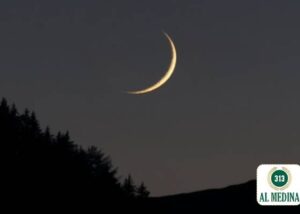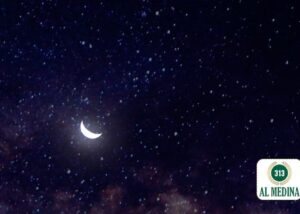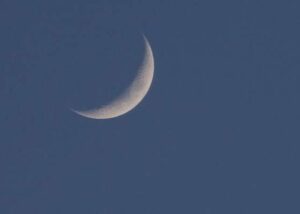What is the definition of a local region in the Shafi’i school in the context of moonsighting?
Quran
Hadith
Islamic Text
Praise be to Allah, and His Salutations and Peace be upon our Master Muhammad ﷺ, all believers and his Companions:
The Shafi’i school, similar to all other Sunni schools of jurisprudence, states that the beginning of a month and end of the previous month is established by the sighting of the new crescent moon or, if it has not been sighted, by completed 30 days of the current month.
Imam an-Nawawi (d. 676), may Allah have mercy on him, says in al-Minhaj’ut-Talibin:
يجب صوم رمضان بإكمال شعبان ثلاثين أو برؤية الهلال
“Fasting Ramadan is an obligation by the completion of 30 days of Sha’ban or by sighting the new crescent moon.”
In order for the rules that may follow the entrance of a new month and end of a current month to be binding on a community, a Muslim judge is required to authorise this and they are also bound by certain conditions that must be fulfilled prior to passing judgement, otherwise their rule can be void.
One of the conditions the Shafi’i school include in order for the entrance of a new month and end of the current month by the naked-eye sighting of the new crescent moon by a community to be binding on another community located in a different region who have not sighted the new crescent moon is for these two regions to be within a Maṭla’ (local region). If they are within the same “local region” and the judge/ruler is the same, then the rule will be binding on all residents within the “local region”. If, however, a community is outside of the “local region” even if the place is under the jurisdiction of the same ruler/judge, it will not become binding nor permitted for residents in that particular region to follow the judgement according the Shafi’i school. Imam an-Nawawi (d. 676), may Allah have mercy on him, says in al-Minhaj’ut-Talibin:
وإذا رئي ببلد لزم حكمه البلد القريب دون البعيد في الأصح، والبعيد مسافة القصر، وقيل باختلاف المطالع. قلت هذا الأصح والله أعلم
“If it (the new crescent moon) has been sighted in a place, the consequent rule will also be binding on the places that are in proximity rather than the distance places according to the Asah position. Distant is the distance that permits shortening prayers. Another position states it is based on different Matali’ (regions). I say that the latter is Asah, and Allah knows best.”
One of the foundations for this is the tradition reported by Muslim (1087 -28) and others on the authority of Abd-Allah b. Al-‘Abbas, may Allah be pleased with them both, who said,
عَنْ كُرَيْبٍ، أَنَّ أُمَّ الْفَضْلِ بِنْتَ الْحَارِثِ، بَعَثَتْهُ إِلَى مُعَاوِيَةَ بِالشَّامِ، قَالَ: فَقَدِمْتُ الشَّامَ، فَقَضَيْتُ حَاجَتَهَا، وَاسْتُهِلَّ عَلَيَّ رَمَضَانُ وَأَنَا بِالشَّامِ، فَرَأَيْتُ الْهِلَالَ لَيْلَةَ الْجُمُعَةِ، ثُمَّ قَدِمْتُ الْمَدِينَةَ فِي آخِرِ الشَّهْرِ، فَسَأَلَنِي عَبْدُ اللهِ بْنُ عَبَّاسٍ رَضِيَ اللهُ عَنْهُمَا، ثُمَّ ذَكَرَ الْهِلَالَ فَقَالَ: مَتَى رَأَيْتُمُ الْهِلَالَ؟ فَقُلْتُ: رَأَيْنَاهُ لَيْلَةَ الْجُمُعَةِ، فَقَالَ: أَنْتَ رَأَيْتَهُ؟ فَقُلْتُ: نَعَمْ، وَرَآهُ النَّاسُ، وَصَامُوا وَصَامَ مُعَاوِيَةُ، فَقَالَ: ” لَكِنَّا رَأَيْنَاهُ لَيْلَةَ السَّبْتِ، فَلَا نَزَالُ نَصُومُ حَتَّى نُكْمِلَ ثَلَاثِينَ، أَوْ نَرَاهُ، فَقُلْتُ: أَوَ لَا تَكْتَفِي بِرُؤْيَةِ مُعَاوِيَةَ وَصِيَامِهِ؟ فَقَالَ: لَا، هَكَذَا أَمَرَنَا رَسُولُ اللهِ صَلَّى اللهُ عَلَيْهِ وَسَلَّمَ “
Kurayb narrated that Umm Fadl bt. Al-Harith sent him to Mu’awiyah, who was in the Levant. He (Kurayb) said, ‘I arrived in the Levant and fulfilled her requests. Ramadan had entered whilst I was in the Levant and I saw the new crescent moon on Friday night. Then, I arrived in Madinah at the end of the month and Abd-Allah b. Al-‘Abbas asked me (regarding this) and then he mentioned the new crescent moon and said, ‘When did you see the new crescent moon?’ I responded, ‘We saw it on Friday night.’ He replied, ‘You saw it?’ I said, ‘Yes, and the people saw it and they began fasting and Mu’awiyah began fasting.’ He (Abd-Allah b. Al-‘Abbas) then said, ‘However, we saw it on Saturday night, so we will continue to fast until we complete 30 days or until we see it.’ I then said, ‘Does the sighting of Mu’awiyah not suffice nor his beginning of fasting?’ He said, ‘No, this is how the Messenger of Allah ﷺ commanded us.’”
As for what defines a Maṭla’ or “local region”, Shaykh Ibn Hajar al-Haytami (d. 974), may Allah have mercy on him, states in Tuhfat’ul-muhtaj (3/601):
والمراد باختلافها أن يتباعد المحلان بحيث لو رئي في أحدهما لم ير في الآخر غالبا قاله في الأنوار
“And what is meant by different Matla’ is that two regions are distant from one another such that if it is seen in one of them, it would commonly not be able to be seen in the other”. This is mentioned by the author of Al-Anwar.
This statement by Shaykh Ibn Hajar, may Allah have mercy on him, gives a general idea regarding what the scholars were using to determine cut-off points for local regions. Our scholars have provided various cut-off points that can perhaps be summarised as follows:
- Classical scholars (such as Shaykh Ibn Hajar al-Haytami, Imam Shihab’ud-Din ar-Ramli, Imam Shams’ud-Din ar-Ramli and Imam al-Khatib ash-Shirbini) agree that any place that is within a radius of 24 farsakh (equates to approx. 120 – 133km) from the area of sighting is considered as a Maṭla’ or “local region”.
- From 133km up to a place where its sunset is longer than 32 minutes from the sunset of another place, our scholars differ as to whether they are a Maṭla’, “local region”, or not. Shaykh BaMakhramah (d. 952) and others consider within this radius to be a Maṭla’ or “local region”, whilst Imam at-Tibrizi and others consider this region to be doubtful.
- Anywhere which has a sunset beyond 32 minutes from the sunset at the place of the sighting, is agreed to not be a Maṭla’ or “local region”.
Based upon the above, a common practice that I have observed in the UK which relies upon Morocco as a “local region” is not acceptable nor permitted in the Shafi’i school as it does not meet the parameters that identify a Maṭla’ or “local region” in accordance to what our classical scholars stipulate. Therefore, this practice is unacceptable in accordance to the Shafi’i school.
And Allah knows best.
– Answered by Shaykh Mohammed Jamili, Jeddah, 12th Dhul Hijjah 1442 (22.07.2021)
See also:






